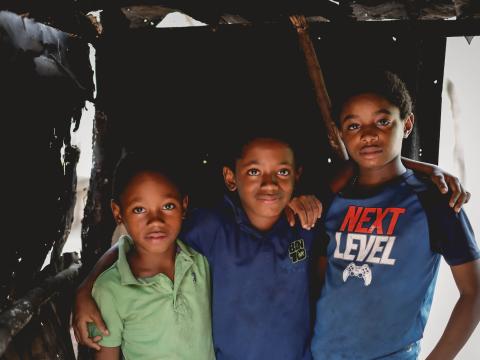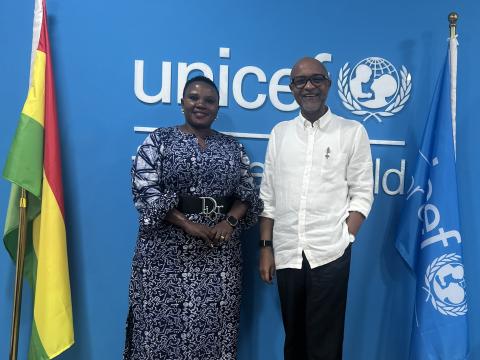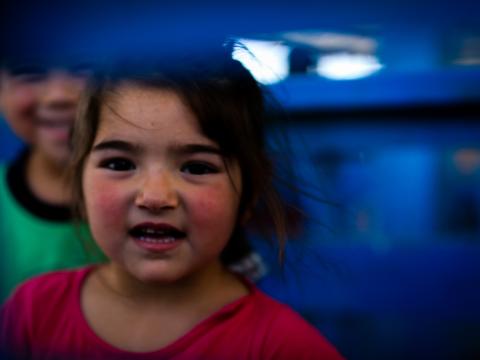
We Are Failing Haiti’s Children; the World Must Wake Up
Dr. Lesly Margel Michaud underscores the urgent need for coordinated action to safeguard children in Haiti, drawing attention to the profound consequences of violence, displacement, trauma and systemic neglect. He calls on all stakeholders—local, national, and international—to step up and prioritise child protection as a shared responsibility.
Haiti is not just in crisis; it is collapsing. At the heart of this collapse are children—frightened, hungry, traumatised, and forgotten.
Over the past year, I’ve listened to the voices of children and families across our battered nation. What they tell me is not just heartbreaking, it is a cry to our collective conscience.
Some of the statistics included in a report we have just compiled about the situation facing girls and boys show that things are worsening. Last year, there were almost 2,300 grave violations against children recorded in Haiti —a staggering 490% increase on the previous year. These are not just numbers. They are children who have been abducted, raped, killed, or recruited by gangs. They are children who have lost their homes, schools, parents, and sense of safety and hope.
In our latest report, A Generation Living in Fear, World Vision consulted 840 individuals across departments severely affected by gang violence and the resulting forced displacement: West, Central Plateau, Nippes, Grand’Anse, and South-East. We heard from children who no longer go to school because it is too dangerous, from girls who fear leaving home because they might be attacked, and from boys who fear they might be shot while on the street.
These are not isolated fears. They are so widespread that significant percentages of children told us they suffered heart palpitations caused by stress, that they lived in constant fear, even when at home, with some contemplating suicide due to the hopelessness of their situation. This is the daily reality for hundreds of thousands of children in Haiti. Gang violence has turned neighborhoods into war zones. Schools have been burned or occupied. Hospitals have shut down. Over 1.3 million people are now internally displaced, and more than half the population is food insecure.
But the deepest wounds are invisible. My staff, and other agencies who are trying to support children in this extremely challenging context, tell me of the psychological scars children carry —nightmares, anxiety, aggression, and withdrawal, among others. Caregivers describe children who wet the bed, who flinch at loud noises, who no longer speak. This is what trauma looks like when it is left untreated. And it is happening on a massive scale.
Girls are especially at risk. Between January and May this year, 3,800 cases of gender-based violence were reported. Many of these involved adolescent girls who were attacked while fleeing violence or searching for food and water. In Port-au-Prince’s Cité Soleil, 80% of women and girls are estimated to have experienced sexual violence 1. This is not just a protection crisis —it is a moral emergency. And yet, the world remains largely silent.
I understand that Haiti is complex. That the politics are messy. That the risks are high. But complexity is no excuse for inaction. We cannot allow an entire generation to be sacrificed to fear and neglect.
At World Vision, we are doing everything we can. We deliver food, water, shelter, medical care, and psychosocial support to displaced families. We are creating child-friendly spaces where children can play, learn, and begin to heal. We are training teachers to support traumatised students. We are working with faith leaders and community networks to monitor child rights violations and reconnect separated families. But we cannot do this alone.
We need the Government of Haiti to restore the rule of law and prioritise the protection of civilians, especially children and girls. We need international donors and UN agencies to scale up humanitarian assistance and invest in long-term recovery. We need civil society and the Church to continue their vital role as protectors and advocates.
And we need the global public to care.
Because what is happening in Haiti is not just a Haitian problem. It is a human one. It is a test of our shared values, and our collective will. Will we look away, or will we act?
I have seen the courage of Haiti’s children. I have seen their resilience, their hope, their determination to survive. But they should not have to be this brave. They should not have to carry this burden.
Lesly Michaud leads World Vision’s programmes in Haiti, focused on protecting children from armed violence, hunger, and displacement. With over 15 years of experience in fragile contexts, he collaborates with communities, churches, and local actors to safeguard rights amidst one of the longest-running humanitarian crises in the Americas.
References
The ‘A Generation Living in Fear report is available online here: https://worldvisionamericalatina.org/childrenonthemove/

